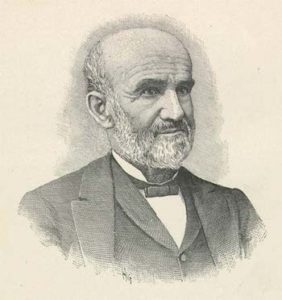
John G. Fee Jr.
*John G. Fee Jr. was born on this date in 1816. He was a white-American abolitionist, minister, and educator. John Gregg Fee Jr. was born in Bracken County, Kentucky, and was the son of John Fee and Elizabeth Bradford, whose mother was a Quaker from Pennsylvania. His father inherited a bondsman who reached the term of his indenture. He then began to buy enslaved people. Later, he recognized more of its problems and invested in lands in free states, but held on to his slaves throughout his life and opposed his son's abolitionism.
Following his conversion to Christianity at age 14, John Fee, Jr. studied at Augusta College in Bracken County, Kentucky, and Miami University in Oxford, Ohio. He then entered Lane Theological Seminary in Cincinnati, Ohio, in 1842; while studying for the ministry, he made lifelong friendships. Young Fee became a staunch abolitionist, vowing to "Love thy neighbor as thyself."
Fee returned to Kentucky, preaching against slavery amid widespread pro-slavery sentiment. In the 1840s, the conflict with the Presbyterian Synod of Kentucky opposed his church's refusal of fellowship to slaveholders. He married Matilda Hamilton in September 1844. She was also from Bracken County; they had known each other since they were young, and she supported his strong stance on abolition. They had several children, some of whom died in childhood. Fee left the Presbyterian Church and believed Christianity had to be non-denominational and non-sectarian.
He began writing about abolition, and some of his work was published by the American Missionary Association (AMA), established in 1846. By 1848, the AMA commissioned Fee as an itinerant preacher in Bracken and Lewis counties. In Lewis County, he and parishioners built a Free Church of Christ. In 1853, with a land donation from Cassius M. Clay, a wealthy landowner who supported the church and gradual abolition, Fee founded the town of Berea, Kentucky.
Like-minded people began to gather there. He preached in neighboring counties, often running into violent opposition to his anti-slavery views. In 1855, with other members of Union Church, Fee founded Berea College, the first college in the state that was interracial and coeducational. He modeled the school on Oberlin College of Ohio and hired some of its teachers as his school expanded. There was great interest in the college, as small as it was. Governor Salmon P. Chase of Ohio attended its commencement ceremonies as one of the speakers. Fee and other supporters drew up a constitution for the school and pledged their support with more than 100 acres of land for the college's campus. In 1859, he took his family to Boston, where he attended the AMA Convention and did fund-raising for the school.
Abolitionists also encouraged him to seek help from Henry Ward Beecher's church in Brooklyn, New York. With social tensions increasing in the years leading up to the American Civil War, and especially after John Brown's Raid in December 1859, a band of armed pro-slavery men came to Berea while Fee was still away in the East. They delivered notice to Fee to leave Bracken County. Fee lived with his family in exile in Cincinnati, Ohio, until 1864, when he returned to Berea. He frequently went to Camp Nelson, preaching and teaching enslaved people in military service in the Union Army. Fee worked on arrangements for a school and urged building facilities for the families.
He appealed for funding, which was approved. Barracks, a hospital, and school buildings were built, and teachers for the freedmen were involved until after the end of the war. He and his wife used their funds to help buy land in the area to be allocated as home lots and raise a church and school near there. After the war, Fee and others established the Christian Missionary Association of Kentucky, consisting of individuals rather than churches.
He also devoted his efforts to Berea College, which experienced significant growth after the war. The school accepted freedmen and women and expanded from its one room. Fee recruited additional teachers from Oberlin College, and in 1873, it was awarded its first college degree. Starting in the late 19th century, President William Goodell Frost recognized the need for education among people in Appalachia and started the school's commitment to that region. John Fee Jr. died on January 9, 1901.